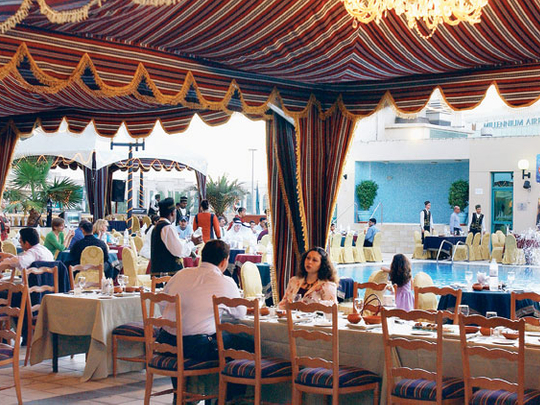
Dubai: For the hospitality industry, Ramadan is no ordinary time of year. The fasting month brings along late working hours, busy restaurants and for many a slowing business.
"It is a little bit [more] quiet than the rest of the year, there is no doubt about that," said Adrian Deegan, Director of Sales at Rotana, Abu Dhabi and Al Ain, of the first ten days of the month.
"But our food and beverage is generally quite busy at iftar time. Most of the hotels' restaurants are normally full," he told Gulf News.
The occupancy levels go down during the first week to ten days, but then they go back to normal, Darwiche said. "If we compare Abu Dhabi to Dubai, Dubai will probably be busier."
Promotions
While Rotana is running promotions for Eid, some resorts which are usually extremely busy and already have bookings have been excluded from the promotion. Getaway places in Ras Al Khaimah, Fujairah and Al Ain are normally full during Eid, Deegan said.
Occupancy percentages go up to around the mid-60s, he said.
"However, it varies from one property to another. At some it would in the mid-80s or 90s depending on how popular the property is."
As the fasting month is starting to go deeper into the hot summer season, predictions are it will become slower year on year. "Next year, for example, it's going to be the entire month of August," Deegan said. Not only that, but additional hotels will have opened, making it a tougher industry.
"It [the market] is getting saturated. The supply of hotels that have opened has surpassed the number of visitors."
Ellen Montanari, a senior consultant at TRI Hospitality Consulting, told Gulf News that Ramadan is a lower occupancy month compared to the rest of the year, according to the statistics the company collects from hotels.
Low season
"Now it's in the summer anyway so it falls with the low season," she said. "I think it's a good thing because you have two low seasons in one go."
Deegan said that the way Rotana competes with that is by offering more attractive packages, better service and better relationships with their clients. "That's what's going to make a hotel survive in this market."
Despite the saturation, Rotana continues to open new properties in the UAE and across the Middle East.
This month Rotana is opening the Khalidiya Palace Rayhaan in Abu Dhabi, the company's 10th property in the emirate.
It will add 443 rooms to the market, totalling up to 3,000 rooms by Rotana hotels alone. "Abu Dhabi is growing, so Rotana wants to grow with it," he said.
However, Montanari said that occupancy levels for Abu Dhabi have been worse this year compared to last year because a lot of new hotels have been added to the market.
"Abu Dhabi has a lot of attractions in the pipeline so a lot are hoping this would help their business."
In Dubai it has been pretty much stagnant, she said. "A lot of hotels are going for big group business so they can stay busy, but their rates have gone down," she said.
Hower, the major focus in Ramadan is on food which brings restaurants and dining places to the top of the list of people's interests.
Although there's a dip in room revenues, Montanari said hotels depend on food and beverage during Ramadan.
Some restaurants use separation curtains in their lobbies so they can still serve meals, she explained.
Food and Beverage Manager Nehme Darwiche at Qasr Al Sarab Desert Resort told Gulf News that Ramadan is nothing but great business. "I wish Ramadan was every month." Darwiche described Ramadan as a marketing campaign in itself. "It's a great month because it markets itself. People will have to go and dine out."
Although restaurants lose the clients they would serve in the morning, Darwiche said that iftar makes up for it twice as much if not more.
"From an entrepreneur's point of view, the iftars are more profitable than the buffets. Iftar makes more money," he said. "There are always people and it doesn't need a lot of marketing."
"Also, there's much focus on Arabic food which is found locally, so we don't need to import anything," he added.
With expectations of 120 people each day at iftar time, Darwiche said that he and his staff work around different staff hours in order to expand capacities.
Andreas Kurfurst, Food and Beverage Director at the Renaissance Hotel, said that the whole month is low key as operations shift to closed restaurants.
"For us particularly, we focus on iftar because we are not allowed to do special functions and events because it would involve music which is not allowed," he said.
Do you stick close to home during Ramadan? Or do you prefer to use this time to take a holiday with your family?











